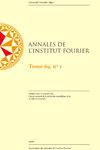负Sobolev空间中三次非线性波动方程的概率局部柯西理论
IF 0.7
4区 数学
Q2 MATHEMATICS
引用次数: 14
摘要
研究了L2(T3)以下随机初始数据的三维三次非线性波动方程(NLW)。通过考虑随机线性解的二阶展开式,我们证明了重归一化NLW在负Sobolev空间中的几乎肯定的局部适定性。我们还证明了负Sobolev空间中无重整化的散焦三次NLW的一个新的不稳定性结果,该结果符合随机偏微分方程研究中所谓的琐碎性的精神。更准确地说,通过研究具有给定光滑确定性初始数据加上一定截断的随机初始数据的(未重新归一化)NLW,我们证明,当截断后,对于任何确定性初始数据,解在分布意义上收敛于0。的简历。-关于3维的本文章由计算机程序翻译,如有差异,请以英文原文为准。
Probabilistic local Cauchy theory of the cubic nonlinear wave equation in negative Sobolev spaces
— We study the three-dimensional cubic nonlinear wave equation (NLW) with random initial data below L2(T3). By considering the second order expansion in terms of the random linear solution, we prove almost sure local wellposedness of the renormalized NLW in negative Sobolev spaces. We also prove a new instability result for the defocusing cubic NLW without renormalization in negative Sobolev spaces, which is in the spirit of the so-called triviality in the study of stochastic partial differential equations. More precisely, by studying (unrenormalized) NLW with given smooth deterministic initial data plus a certain truncated random initial data, we show that, as the truncation is removed, the solutions converge to 0 in the distributional sense for any deterministic initial data. Résumé. — On étudie l’équation des ondes non linéaire cubique (NLW) en dimension 3 avec une donnée initiale aléatoire en-dessous de L2(T3). En considérant le développement d’ordre 2 en termes de la solution aléatoire linéaire, on prouve le caractère presque sûrement localement bien posé de NLW renormalisée dans les espaces de Sobolev d’indices négatifs. On montre aussi un nouveau résultat d’instabilité pour l’équation NLW cubique défocalisante sans renormalisation dans les espaces de Sobolev d’indices négatifs, dans l’esprit du caractère non trivial dans l’étude des équations aux dérivées partielles stochastiques. Plus précisément, en étudiant NLW non renormalisée avec des données initiales régulières déterministes plus une donnée initiale aléatoire tronquée, on montre que, dès que la troncature est supprimée, les solutions tendent vers 0 au sens des distributions pour toute donnée initiale déterministe.
求助全文
通过发布文献求助,成功后即可免费获取论文全文。
去求助
来源期刊
CiteScore
1.70
自引率
0.00%
发文量
92
审稿时长
1 months
期刊介绍:
The Annales de l’Institut Fourier aim at publishing original papers of a high level in all fields of mathematics, either in English or in French.
The Editorial Board encourages submission of articles containing an original and important result, or presenting a new proof of a central result in a domain of mathematics. Also, the Annales de l’Institut Fourier being a general purpose journal, highly specialized articles can only be accepted if their exposition makes them accessible to a larger audience.

 求助内容:
求助内容: 应助结果提醒方式:
应助结果提醒方式:


